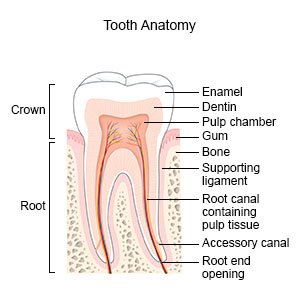Toothache
Medically reviewed by Drugs.com. Last updated on Apr 6, 2025.
What is a toothache and what causes it?
A toothache is pain that is caused by irritation of the nerves in the center of your tooth. The irritation may be caused by several problems, such as a cavity, an infection, a cracked tooth, or gum disease.
 |
How is a toothache diagnosed?
Your healthcare provider will ask how long you have had a toothache. He or she will also ask if you have any other symptoms or medical conditions. Your healthcare provider will examine your tooth and mouth. Your provider may also examine your face and neck. You may need x-rays to check for an infection or cracked tooth.
How is a toothache treated?
Treatment depends on the cause of your toothache. You may need any of the following:
- NSAIDs , such as ibuprofen, help decrease swelling, pain, and fever. This medicine is available with or without a doctor's order. NSAIDs can cause stomach bleeding or kidney problems in certain people. If you take blood thinner medicine, always ask if NSAIDs are safe for you. Always read the medicine label and follow directions. Do not give these medicines to children younger than 6 months without direction from a healthcare provider.
- Acetaminophen decreases pain and fever. It is available without a doctor's order. Ask how much to take and how often to take it. Follow directions. Acetaminophen can cause liver damage if not taken correctly.
- Prescription pain medicine may be given. Ask your healthcare provider how to take this medicine safely. Some prescription pain medicines contain acetaminophen. Do not take other medicines that contain acetaminophen without talking to your healthcare provider. Too much acetaminophen may cause liver damage. Prescription pain medicine may cause constipation. Ask your healthcare provider how to prevent or treat constipation.
- Antibiotics help treat or prevent a bacterial infection.
Treatment options
The following list of medications are related to or used in the treatment of this condition.
How can I manage my toothache?
- Rinse your mouth with warm salt water 4 times a day or as directed.
- Eat soft foods to help relieve pain caused by chewing.
- Apply ice on your jaw or cheek for 15 to 20 minutes every hour or as directed. Use an ice pack, or put crushed ice in a plastic bag. Cover it with a towel before you apply it. Ice helps prevent tissue damage and decreases swelling and pain.
How can I help prevent a toothache?
- Brush your teeth at least 2 times a day.
- Use dental floss to clean between your teeth at least 1 time a day.
- See your dentist regularly every 6 months for dental cleanings and oral exams.
When should I seek immediate care?
- You have trouble breathing or swallowing.
- You have swelling in your face or neck.
When should I contact my dentist?
- You have a fever and chills.
- You have trouble opening or closing your mouth.
- You have swelling around your tooth.
- You have questions or concerns about your condition or care.
Care Agreement
You have the right to help plan your care. Learn about your health condition and how it may be treated. Discuss treatment options with your healthcare providers to decide what care you want to receive. You always have the right to refuse treatment. The above information is an educational aid only. It is not intended as medical advice for individual conditions or treatments. Talk to your doctor, nurse or pharmacist before following any medical regimen to see if it is safe and effective for you.© Copyright Merative 2025 Information is for End User's use only and may not be sold, redistributed or otherwise used for commercial purposes.
Learn more about Toothache
- Dosage Charts for Infants and Children
- Motrin Dosage Charts for Infants and Children
- Tylenol Dosage Charts for Infants and Children
- What are the risks of mixing pain medications and alcohol?
Treatment options
Care guides
Further information
Always consult your healthcare provider to ensure the information displayed on this page applies to your personal circumstances.
